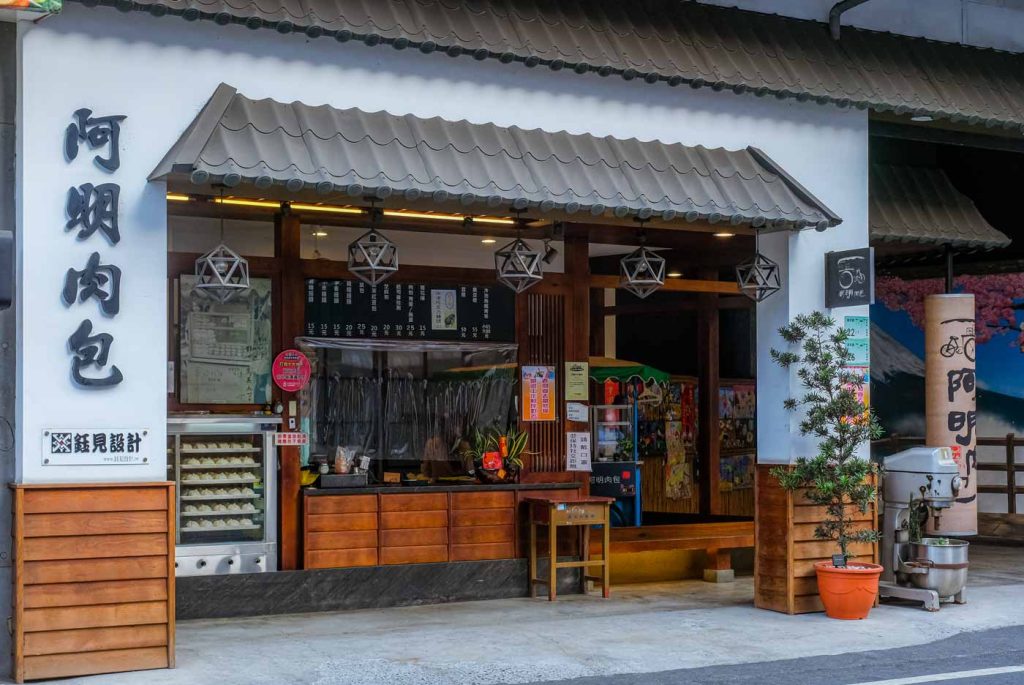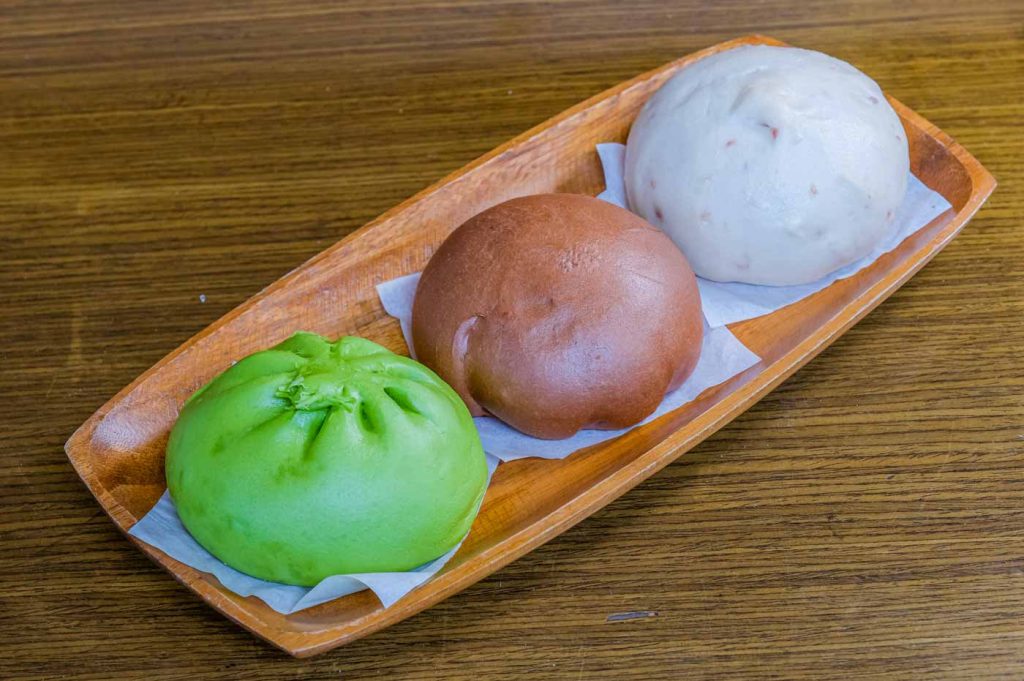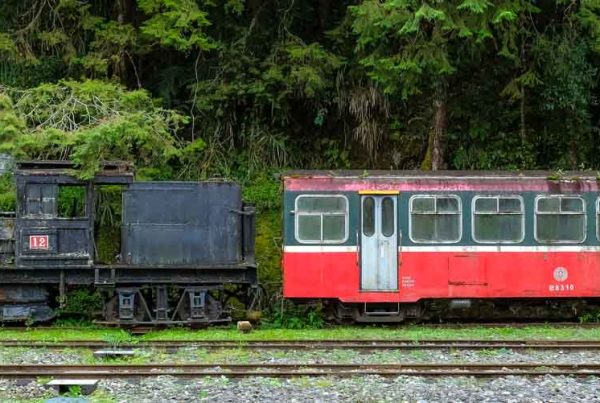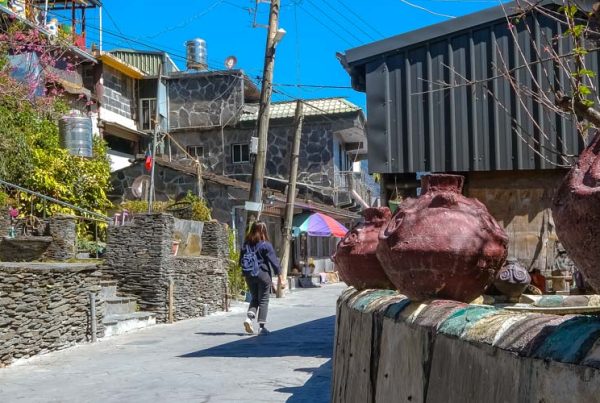Central Flatlands, Mountainous Interior, Strait-side Coastal Zone
TEXT / RICK CHARETTE
PHOTOS / ALAN WEN, VISION
The northern region of Pingtung County, in Taiwan’s far south, is not given much space in the big international English-language travel guides, but there’s much that’s rewarding for the traveler from overseas to do and see. And new attractions keep coming on-line, many of these giving new tourism missions to old spaces – as you’re about to learn.
When you mention Pingtung County to Taiwan locals and expats, what first comes to mind for most is Kenting National Park on the island’s south tip, a balmy Hawaii-style surf-fun hotspot. But there’s much, much more to the county than this. This issue we bring you Pingtung’s north, also filled with worthwhile tourist attractions. There’s a farm-fecund plains area in the center, mountainous area on the east and south with tribal-culture riches, and a west-side Taiwan Strait coastal area teeming with marine-ecology recreational bounty. We explore these various areas in separate articles, starting here with Pingtung City and nearby areas on the central flatlands.
Content
Pingtung City
The word “Pingtung” means “east of Mount Banping.” This low mountain is just off the coast in Kaohsiung City’s urban core, one of the south’s earliest areas of Han Chinese settlement. Small Pingtung City sits on the wide Pingtung Plain, an important commercial-farming region.
Craftsman Residential District
This young attraction is about six blocks northwest of Pingtung Railway Station. A cultural-creative platform for young local entrepreneurs, with over 30 start-up ventures, this was once a neighborhood of Forestry Bureau dormitory residences. Reflecting the quest of elevated life aesthetics pursued by today’s resident creative teams, the neighborhood itself has been enchantingly re-imagined as a single integrated work of art, each individual building exterior a dynamic 3D mural canvas.

The colors and air of exotic European city-style romance become especially vivid at night when the mini-community glows with strategically positioned lighting. The public has artfully dubbed the enclave “little Paris.” The bohemian backdrops have brought an explosion of popularity and steady streams of photo enthusiasts, especially selfie-takers: circular stairs climbing a thick cypress tree up to treetop mini-houses, a wall of giant pink flowers rendered as a finished jigsaw puzzle, a Volkswagen Beetle parked in a garage for repairs….
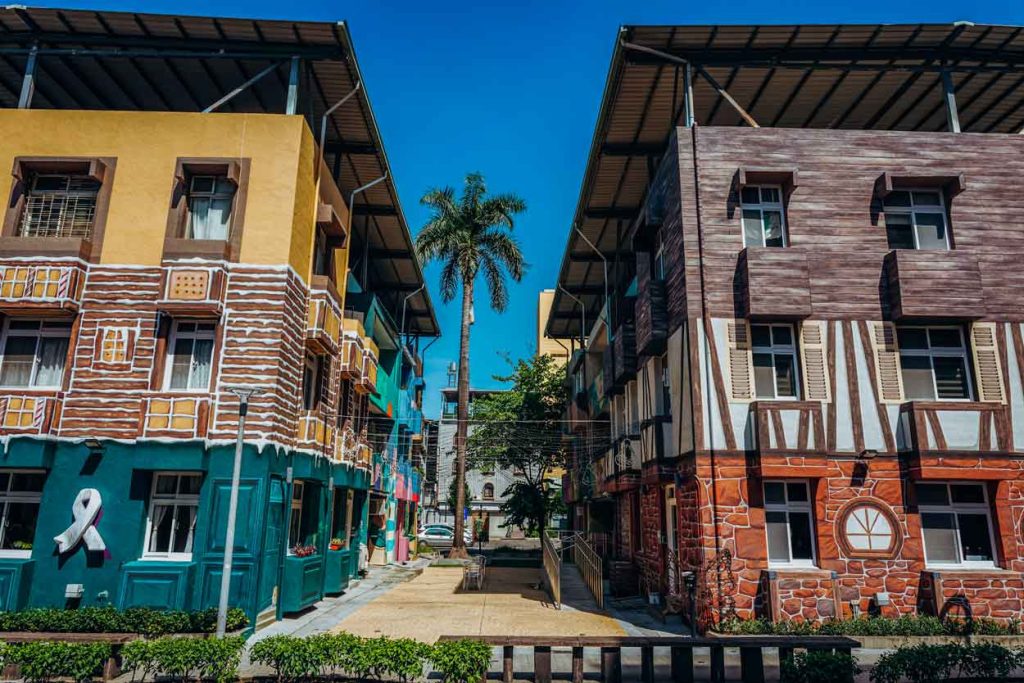

There’s a diversity of retail enterprises, with numerous spots to sit down for a drink or bite, notably at cafés. Outside the Changan Noodle restaurant entrance you’ll be greeted by a thick “screen” of pulled noodles. Much of the white-ceramic tiling and terrazzo flooring of this site’s original dormitory residence has been retained, complemented by stylish modern materials. The noodles are made with high-gluten flour, no additives used, slow-dried naturally in the traditional south Taiwan manner using sun and breeze. The food is “traditional Taiwan country,” the signature dish being noodles with spring onion oil.


Craftsman Residential District
(職人町)
Add: No. 1-2, Lane 43, Rende Rd., Pingtung City, Pingtung County
(屏東縣屏東市仁德路43巷1-2號)
Tel: (08) 733-6435
Facebook: www.facebook.com/propingtung
Changan Noodle
(長安製麵)
Add: 1F, No. 1-2, Lane 43, Rende Rd., Pingtung City, Pingtung County
(屏東縣屏東市仁德路43巷2號1樓)
Tel: 0978-506-978
Hours: 10:30am ~ 7:30pm (closed on Mon.)
Website: shop.changantw.com (Chinese)
Facebook: www.facebook.com/changantw
Pingtung 1936 Tobacco Culture Base
This rambling protected heritage complex, which dates to 1936, was reopened as a Pingtung culture and history learning base in 2021. Spread over 4.2ha, this was formerly the Pingtung Tobacco Factory, closed in 2002. Taiwan’s long-flourishing tobacco cultivation and processing industry found it could not compete in the face of international competition after the country’s World Trade Organization entry. The industrial facility was built by the Japanese during their 1895~1945 period of Taiwan colonial rule and originally operated as the Pingtung Branch Tobacco Re-drying Plant.
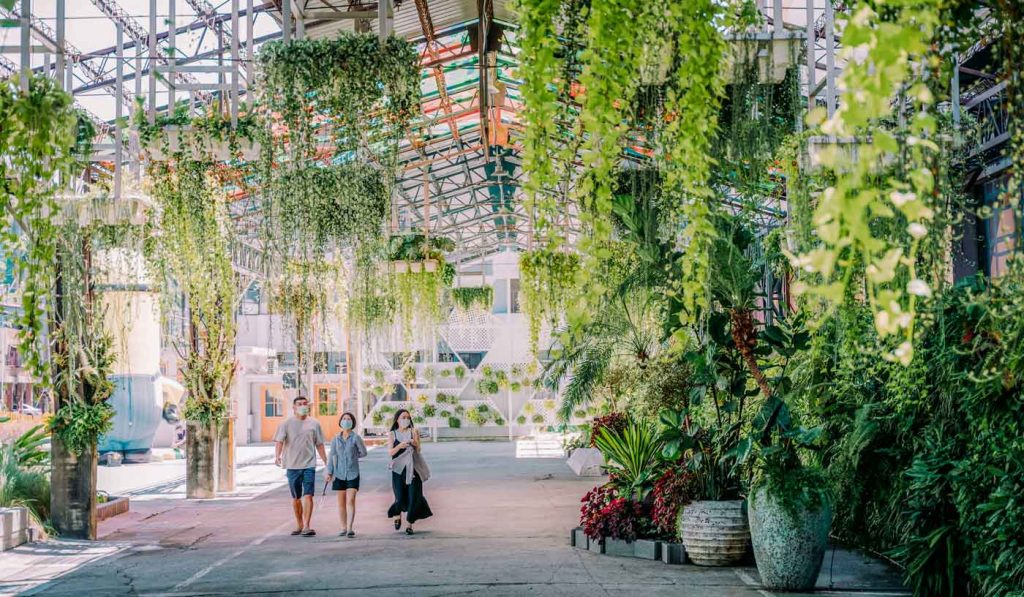

Under the ongoing Pingtung County Museums Project, it was decided to transform the site into a base telling the Pingtung story through an industrial lens and depicting the Pingtung soul through art. Beyond tobacco, last century Pingtung also had especially strong rice and sugar industries.
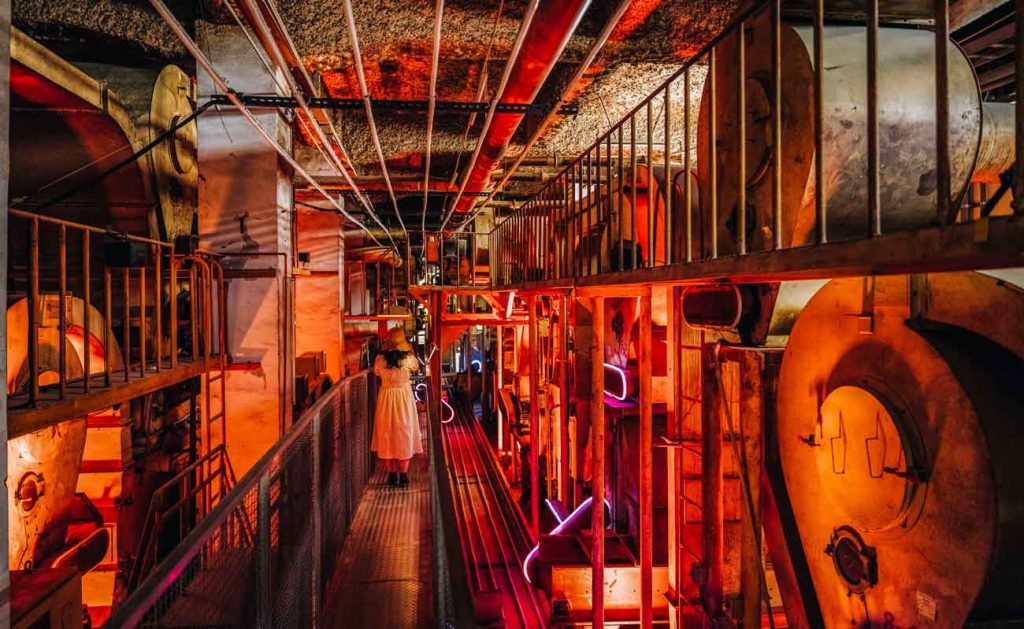
Already on-line are the Pingtung Tobacco Factory Museum and Pingtung Hakka Museum. Visitors can take in exhibitions on a coterie of Pingtung-related cultural, historical, and art themes, and can roam through such refurbished areas as the boiler room, repair shop, fumigation room, re-drying area, clocking room, warehouses (where the exhibitions are held), and bunker. Audio guide and AR experiences are available (Chinese).
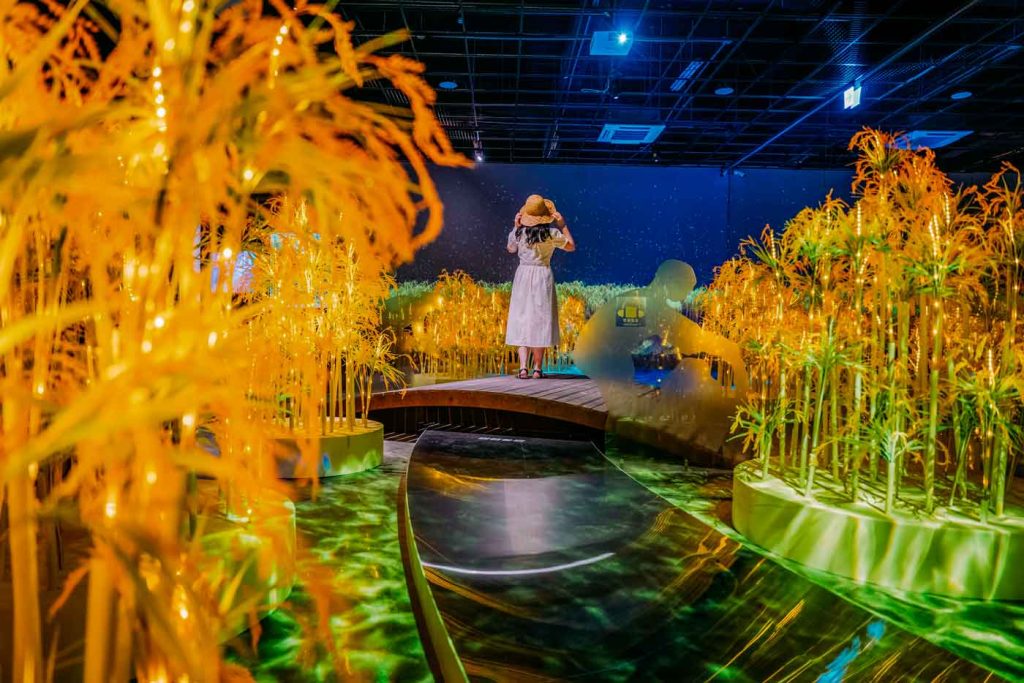
To come on-line down the road are museums focused on art, local indigenous peoples, and immersive experiences.
Pingtung 1936 Tobacco Culture Base
(屏菸1936文化基地)
Add: No. 1, Yanchang Rd., Pingtung City, Pingtung County
(屏東縣屏東市菸廠路1號)
Tel: (08) 721-0234
Hours: 9am ~ 6pm (Fri., Sat., and Sun. until 9pm, closed on Mon.)
Website: www.cultural.pthg.gov.tw/pt1936
Facebook: www.facebook.com/pt1936
Shengli Star Village [Victory Star V.I.P. Zone]
Shengli Star Village consists of preserved officials’ dormitory residences, other dormitory units, and administration buildings – as well as ruins – from special zones built by the Japanese in the 1920s/1930s for aircraft units. They form Taiwan’s largest and most complete Japanese military officer dormitory complex. After WW II, the Nationalist government took over and expanded the sites for military dependents’ village usage. The three zones, located about seven blocks north of Pingtung’s railway station, are short walks from each other.


Restoration work was commenced in 2018, with two goals: historical preservation and sustainable dual-use of heritage assets for incubation of Pingtung cultural-creative talent. Shengli New Village is the largest of the three areas, consisting of seven full city blocks. Along the tranquil streets are many renovated small Western-style bungalows with Japanese black-tile roofing, each with a small front and back yard. The enterprises today in residence span a wide spectrum, from eateries serving local/international fare to bakeries to cafes to local-product shops and bookshops and performing-arts venues.
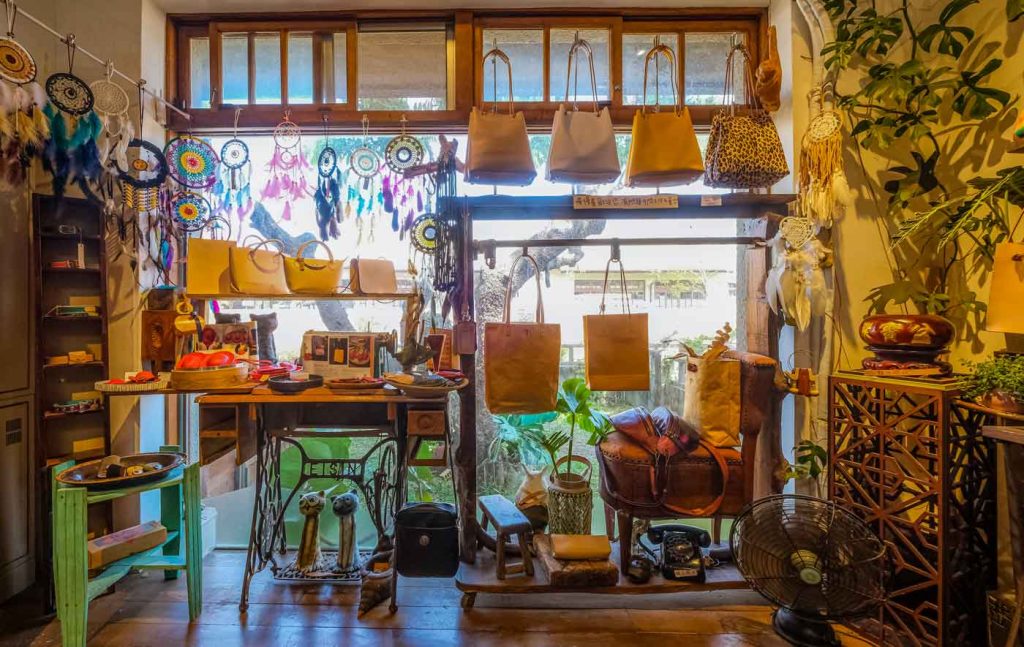
The heart of the village is the Star Plaza, beside which you’ll find the General’s House, which today houses the visitor center. This was the home of successive superintendents of an important associated military academy. The red-door gate is the only remnant from the original enclosure wall. In the yard is a tall theme sculpture made with aircraft auxiliary fuel tanks – in the past, in the face of short supplies, residents used such tanks as household water towers.
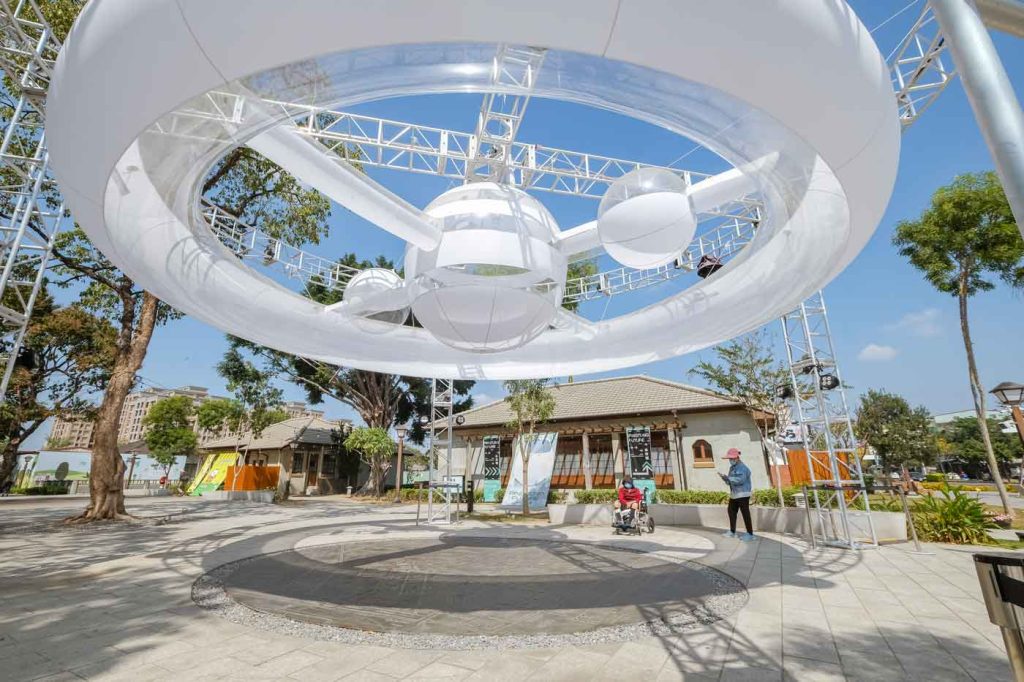
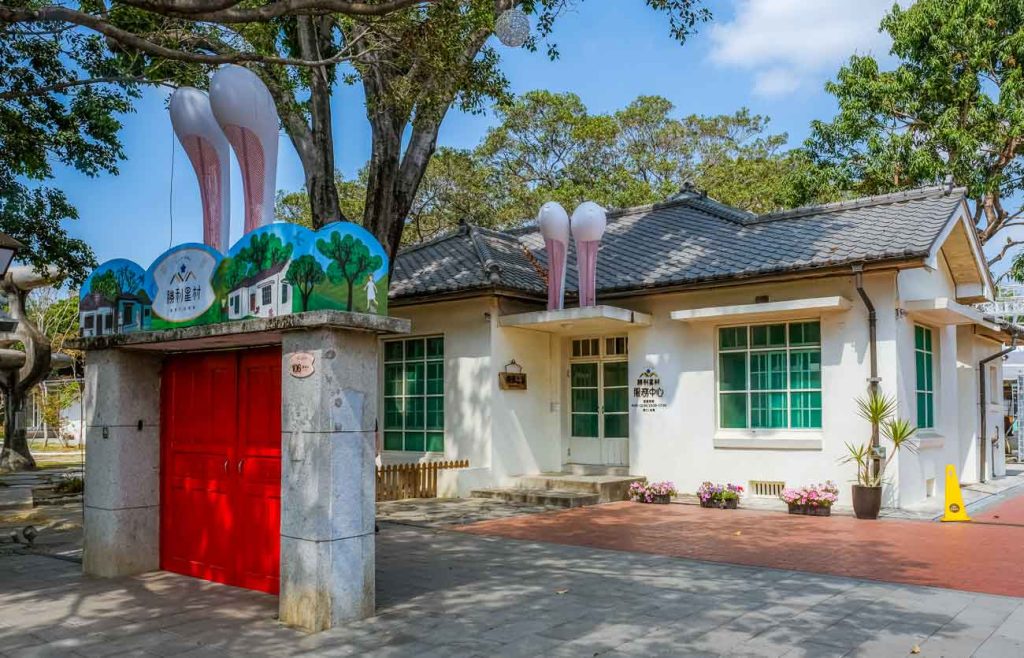
Diagonally across from the General’s House is the 50s Village Grocery Store – a residence transformed to look like an old-days mom-and-pop corner store.

Taking up the westernmost block is the V.I.P. Park, consisting of bungalow ruins that have been reconceptualized as accessible village-motif installation artworks – childhood-memory model airplanes and dreams of aircraft-travel adventure, military dependents’ village life, dorm-residence architectural blueprints, etc.
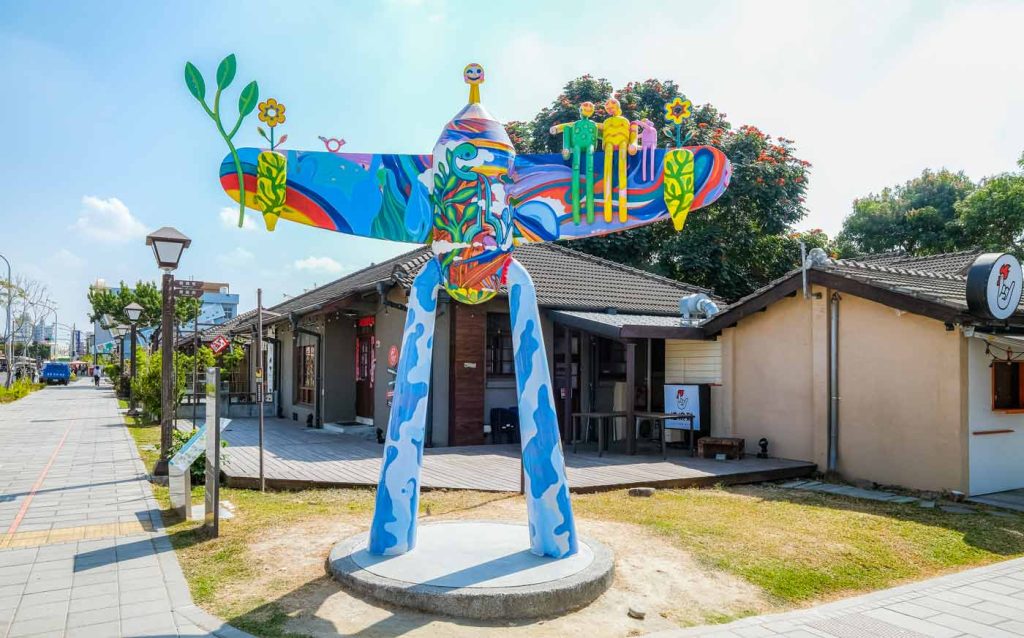
Shengli Star Village [Victory Star V.I.P. Zone]
(勝利星村)
Add: No. 134, Chenggong Rd., Pingtung City, Pingtung County
(屏東縣屏東市成功路134號)
Tel: (08) 732-6512, 732-0567
Hours: Open 24h
Website: www.cultural.pthg.gov.tw/vipzone
Facebook: www.facebook.com/VictorystarInPingtung
Pingtung Harvest
Found on the south side of Shengli New Village, this commercial enterprise consists of six contiguous former bungalow residences along a short, peaceful dead-end street lined on the Pingtung Harvest side with stately old wide-canopy trees providing cool shade in the respective front yards. The street, closed to vehicle traffic, is paved with neat-cut stones.

This venture is presented as a nouveau-style mall showcasing a harvest of the best of Pingtung indigenous products. On the weekend themed exhibits and cultural-arts performances are staged in the outdoor areas.
Each of the six “outlets” has a special theme. For example, in the “weaving” bungalow you’ll see exquisite works of indigenous classic-theme attire on museum-style display, along with for-sale attire, jewelry and headgear. Explanatory sessions are regularly held in which an instructor will don the clothing and accouterments of Pingtung’s various tribes and explain the symbolism and production methods involved with each. You can also choose attire to wear and move about freely to take photos.
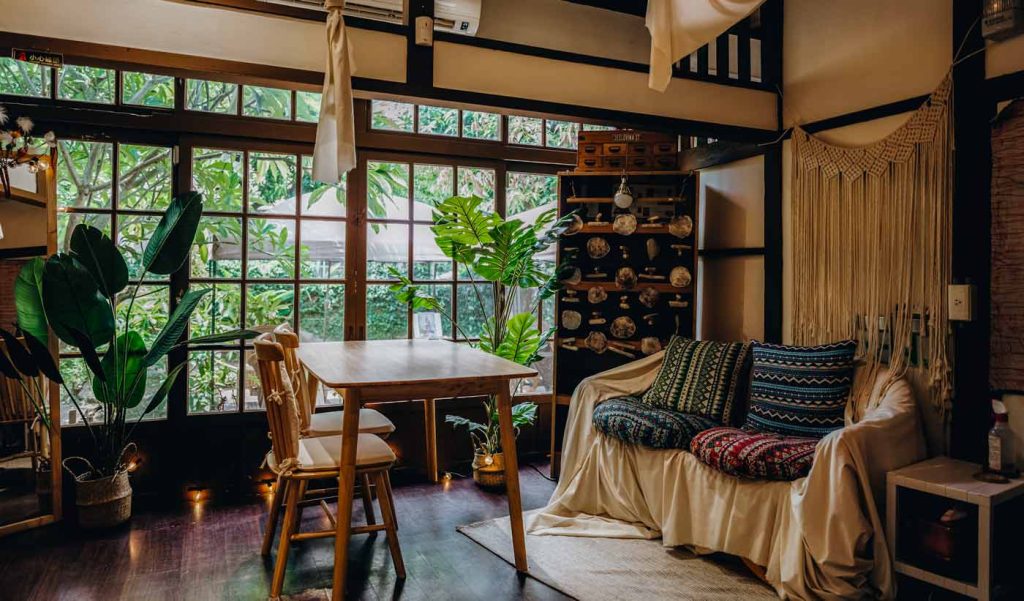
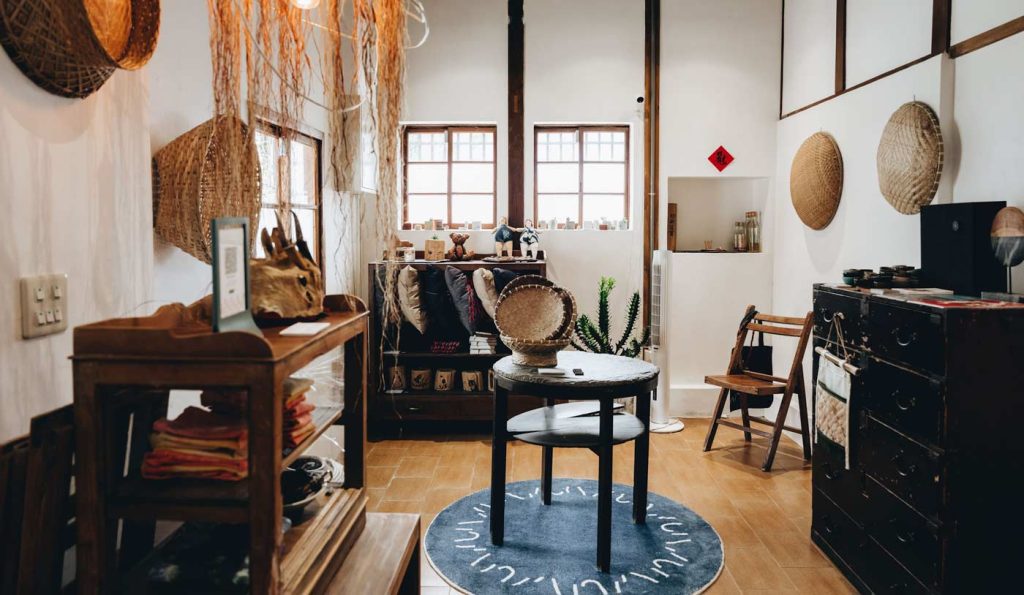
Elsewhere, the “get-together” outlet is a market showcasing creations from 50 Pingtung indigenous enterprises: coffee, glass-bead art, agri-products, and much else. The “sound” outlet has a great selection of CDs and vinyl records for you to pull out and sample.
Pingtung Harvest
(屏東原百貨)
Add: No. 2-12,Kangding St., Pingtung City, Pingtung County
(屏東縣屏東市康定街2-12號)
Yamato Café
In a prominent three-story heritage building one block directly north and in view of the city’s railway station entrance, netizens have declared this the city’s loveliest café. It opened in 2020. This was originally the Japanese-built/operated Yamato Hotel, inaugurated in 1939. Today’s café operator specializes in taking old run-down or abandoned county buildings, renovating them, and opening modern-style cafes while faithfully maintaining the integrity of the original architecture.

The building curves around a corner at a busy intersection. The façade primarily consists of the original flaxen-hue brick, with the original window frames on the second and third levels saved, and the roof is covered with Japanese-style black tiles. The entrance, right on the corner, is fronted by two Roman-style columns. An arcade runs along the full front. You’ll see “Yamato Hotel” in English posted directly above the entrance, and in Japanese above, just below the roof.
The café fills up the first floor. Today the two street-facing walls feature French-style floor-to-ceiling glass, the flooring is red-tint brick laid in European-plaza style, and the long counter is of Scandinavian-style blonde wood. Sections of original wall and ceiling concrete, ceiling beams, etc. have been left exposed, and the stairs to the second floor, made of terrazzo and brown/white tiling, have been left with their original appearance. Lights hang industrial-style at the end of long wires from the high ceiling. In a few spots concrete-color steel support beams have been put up where original interior-wall sections have been eliminated.

The menu (which has English) consists of premium international coffees and Taiwan teas. Two special creations are the Taiwan-theme carbonated fruity teas – pineapple with black tea and strawberry with oolong. Foods consist of such Western-style light baked goodies as quiches and cakes.
Note that because of its popularity a stay limit of two hours is imposed when the café is patron-packed.
Yamato Café
(驛前大和咖啡館)
Add: No. 163, Minzu Rd., Pingtung City, Pingtung County
(屏東縣屏東市民族路163號)
Tel: (08) 766-9777
Hours: 9am ~ 6pm
Facebook: www.facebook.com/yamatocoffee
Meiju Bakery
Meiju Bakery is just southeast of Shengli New Village. It sits inconspicuously yet very conspicuously in a sedate neighborhood of older three/four-story residential domiciles, most with additional structures built on their roofs. “Inconspicuous” because you will not espy this business until almost right in front of it – there is only a very missable pillar-top shop sign. The bakery is on the first floor of its building, set back from the street behind a small terrazzo-covered forecourt-cum-parking space.

When standing directly in front of it, unmissable is how its exterior is conspicuously different from the façade design of the floors above and of the adjacent buildings, which sport sections of tiny-square brown, yellow, and blue ceramic tiling. The bakery has an industrial-style art gallery look, low forecourt enclosure walls and a façade made of fair-faced concrete. Inside is more of the same in the customer area, with bare-concrete walls, floor, and ceiling, the talent-busy kitchen area also featuring large white-tile wall sections. Netizens have christened this Pingtung’s most beautiful bakery.
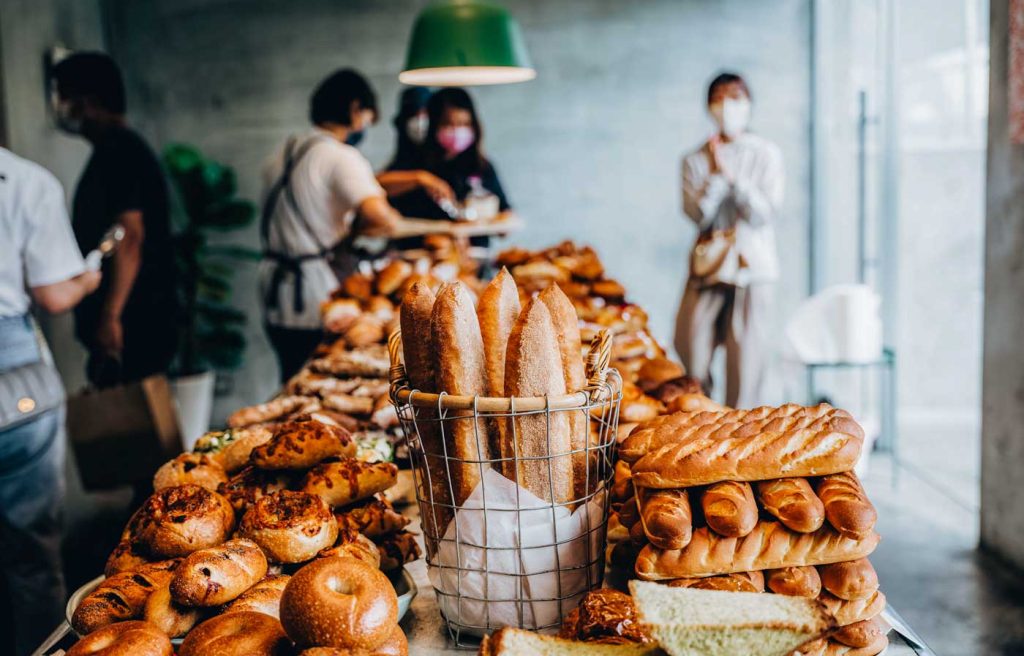
The long central display table is forever dense with an ambrosial smorgasbord of Japanese- and European-style breads and other baked wonders, something hot-from-the-oven being rolled out, it seems, every few minutes. Among the most-in-demand selections: the matcha and adzuki bean thick sliced bread, sesame and adzuki bean thick sliced bread, chocolate bread rolls with “chocolate beans” filling, rolls with a cranberry and cream cheese filling and with a roselle, honey, and cream cheese filling, and puffs with minced-pork filling.

Meiju Bakery
(美菊麵包店)
Add: No. 66, Gongyuan Rd., Pingtung City, Pingtung County
(屏東縣屏東市公園路66號)
Tel: (08) 886-2631
Hours: 12pm ~ 9:30pm (closed on Tue.)
Facebook: www.facebook.com/meiju88
Pingtung County Library
This facility is a compelling artwork in which something old has gone through a magical metamorphosis to emerge as an award-winning something new. Standing within a landscaped 5ha park amidst tall trees in abundance, it has been dubbed “Taiwan’s first forest library.” It’s located about four blocks north/northeast of Shengli New Village.
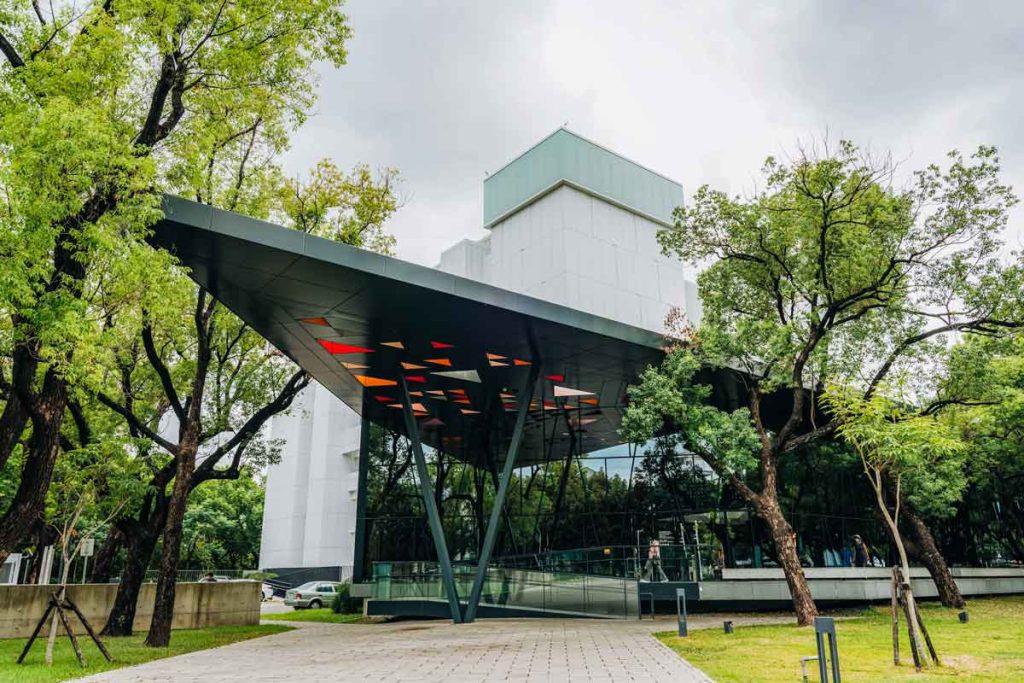
The renovation-and-expansion project had a strong eco-conscious focus. It was decided not to knock down the aging original on-site structure, a cultural center opened in 1983. This eliminated demolition waste and maximized carbon reduction by avoiding much all-new work and materials, while preserving a heritage asset and saving the modest-budget county government much money.
The new library opened in 2021. The spacious high-ceilinged new lobby is an extension from the old structure. Walls of floor-to-ceiling glass face directly into camphor forest on the building’s west side, keeping the interior cool. This space resembles a stylish art gallery rather than a staid traditional-style library zone, and also has a café.
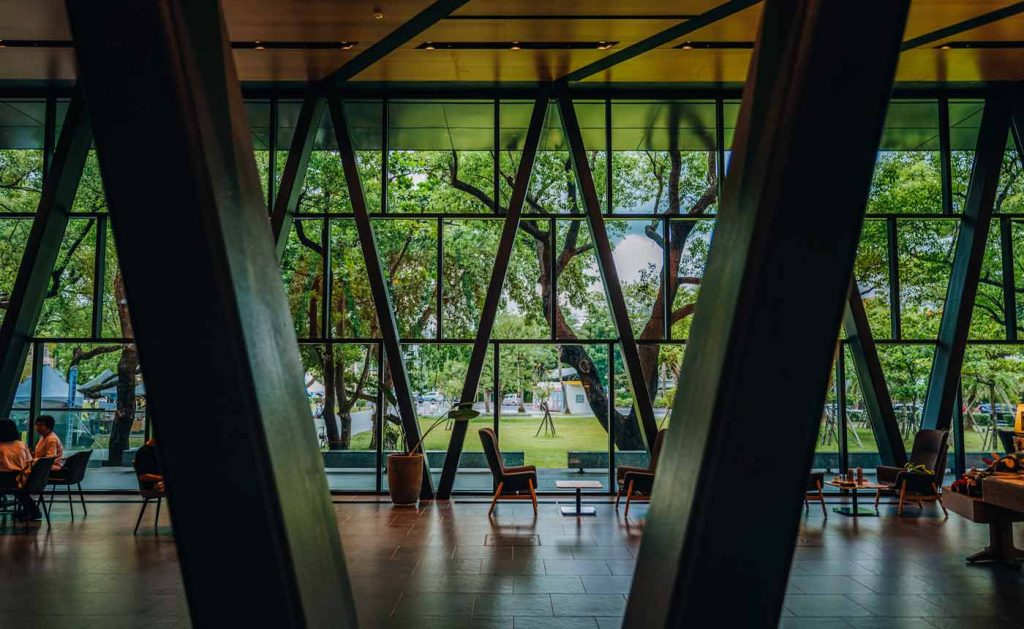
Roomy outdoor reading-area platforms on the second and third levels allow people to leisurely appreciate the aesthetics of the forest at different levels, while the trees generate cooling breezes.
Another inviting feature is a genuine traditional-style slate house built by Paiwan-tribe craftsmen. Dating to the cultural center, it had fallen into disrepair and been closed off. Now rejuvenated and warmed with shell ginger, millet, and other Paiwan-icon adornments, it does double-duty as a section for indigenous peoples’ literature, and as the portal area leading from the third to fourth level.

Pingtung County Library
(屏東縣立圖書館)
Add: No. 69, Dalian Rd., Pingtung City, Pingtung County
(屏東縣屏東市大連路69號)
Tel: (08) 736-0330
Hours: 9am ~ 9pm (closed on Mon. and public holidays
Website: www.cultural.pthg.gov.tw/library
Pingtung County Park
This award-winning park, opened in 2021, takes a large chunk out of the urban build-up on the south edge of the city. It is Taiwan’s first-ever park created on a repurposed industrial site. This was formerly home of a derelict paper mill, opened in 1977 and abandoned in the early 1990s. Sugar production was long a key Taiwan industry, with Pingtung a major sugarcane grower, and the pulp generated locally as a byproduct was used in the paper mill. During its production days the adjacent Pingtung Sugar Factory, today also a tourism-oriented destination, was one of Taiwan’s three main sugar-manufacturing plants.
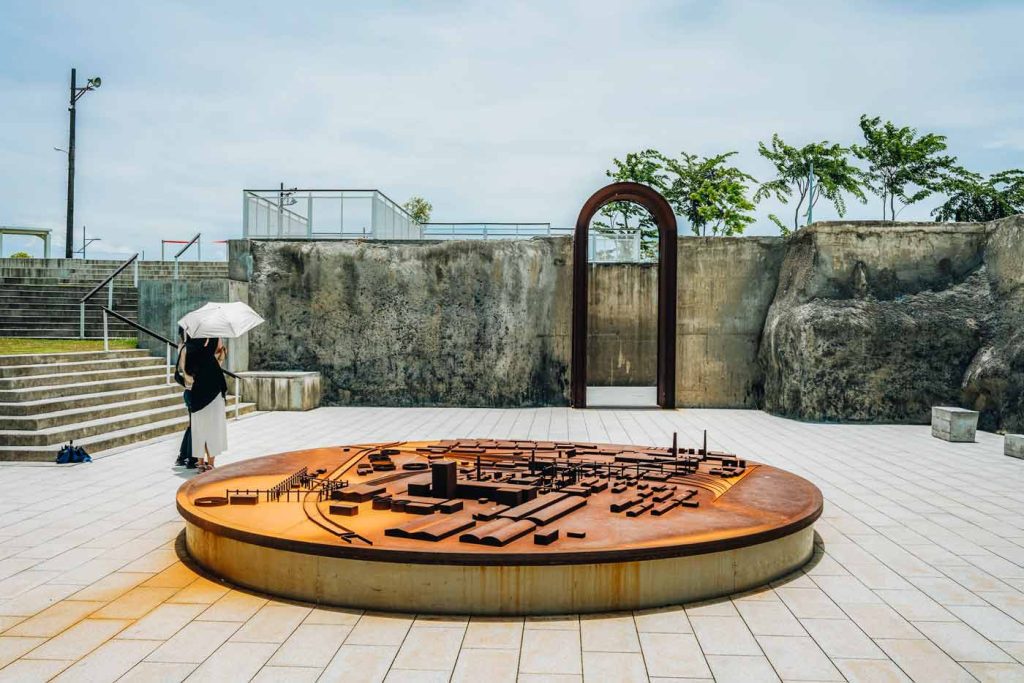
The mill building has been cleverly redesigned, with sections transformed and now put to such uses as a trampoline, a whopping selfie mirror, and a landscape theater. Other elements retained and repurposed include the preparation pond and the wastewater sedimentation tank. The texture of the tank wall’s rusted surface contrasts well with the aesthetics of the stylish new modern-design elements. The tiering of the preparation pond gives the rippling shallow-pond waters the look of a gently cascading waterfall.
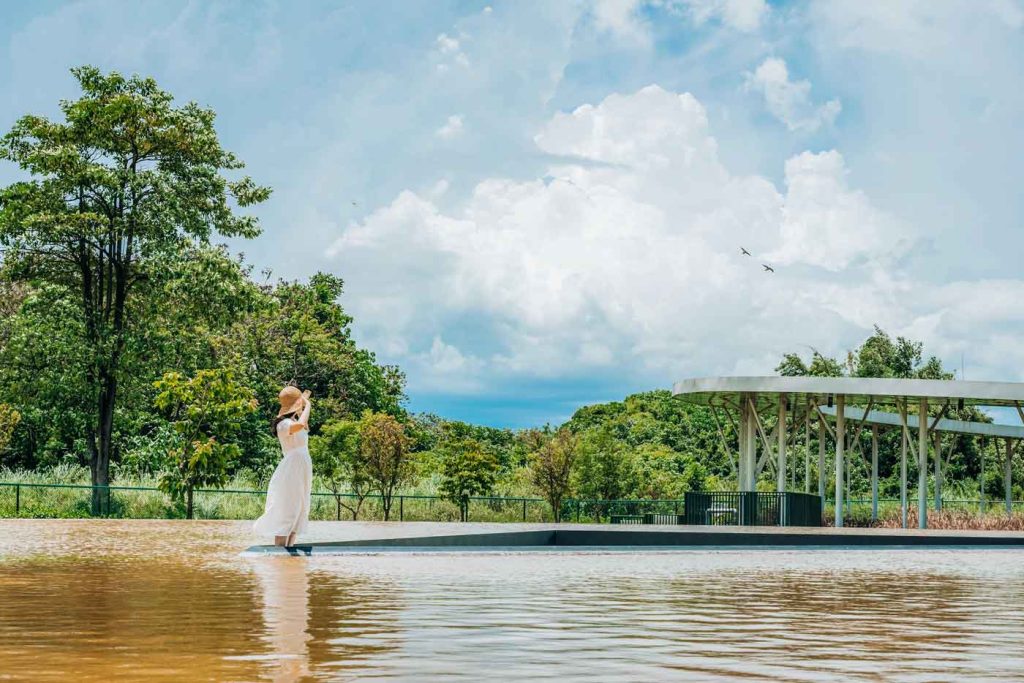
The complex is bathed in ethereal landscape lighting as each evening settles in, the mood of the setting heightened by the watery reflection of nature-made heavens and man-made architecture.
Elsewhere, an expansive kids’ play area has also been created (all-new materials/facilities) that celebrates such important Pingtung agricultural products as lemons, red beans, and onions; for example, youngsters climb up into a super-sized onion-shaped dome to take their pick of bright-colored slides to race down.

Zhutian Township
This farming-dominant township, with a predominantly Hakka population, is southeast of Pingtung City. “Zhutian” means “bamboo fields.” In 2019, celebrated as Small Town Ramble Year in Taiwan, Zhutian was Pingtung’s sole Top Ten Hakka Towns selection.
Zhutian Station
The township’s unbusy railway station sits outside slow-paced Zhutian village. In its front square is a collection of intriguing heritage facilities. The original Zhutian Station (1939) is a classic Japanese-style wood-built work with a cottage look, housing a waiting room, ticket office, and staff office. Beside an old well is a compact concrete-and-wood public bathhouse (1939) for traveler use. The Dr. Ikegami Ichiro Library, “Asia’s southernmost Japanese library,” is in a restored/converted warehouse; the Japanese doctor, head of the local hospital in the 1940s, donated money and his entire vast library to the township.
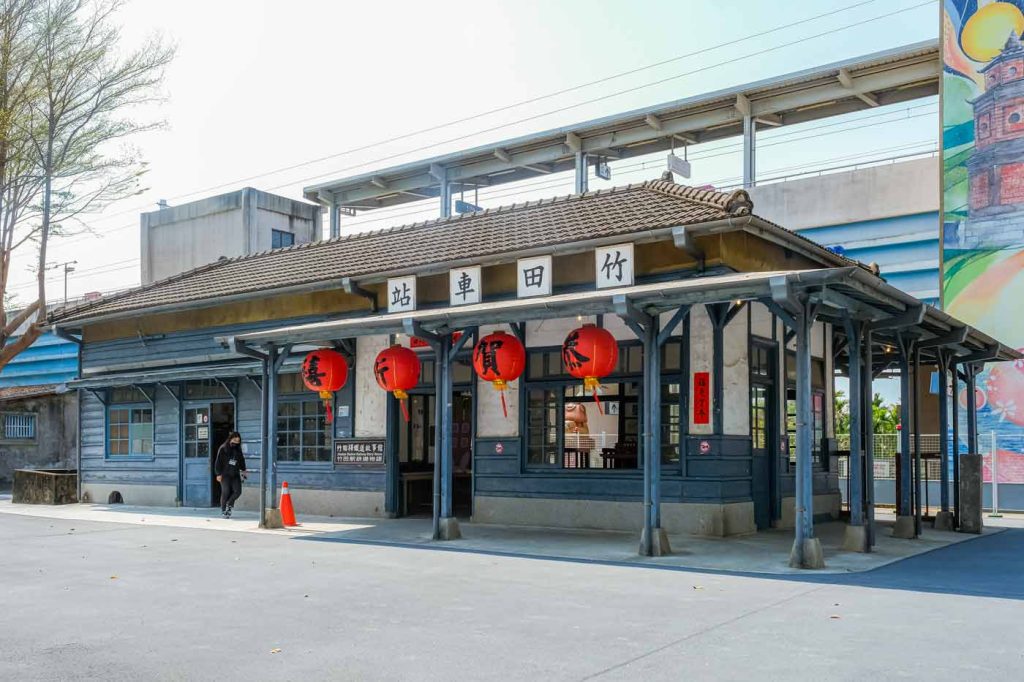
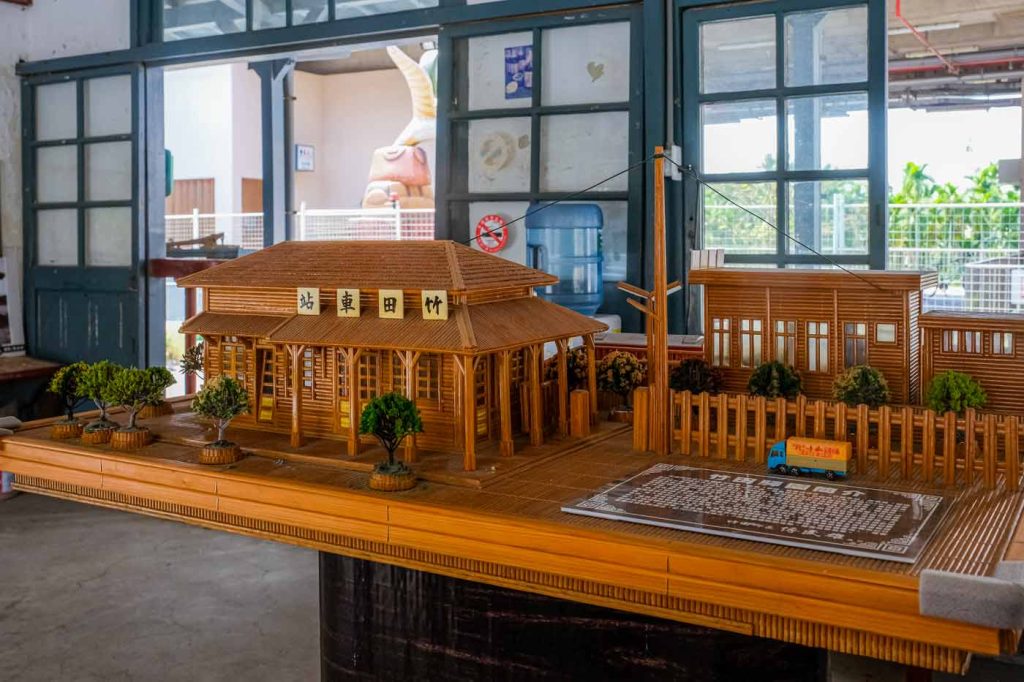
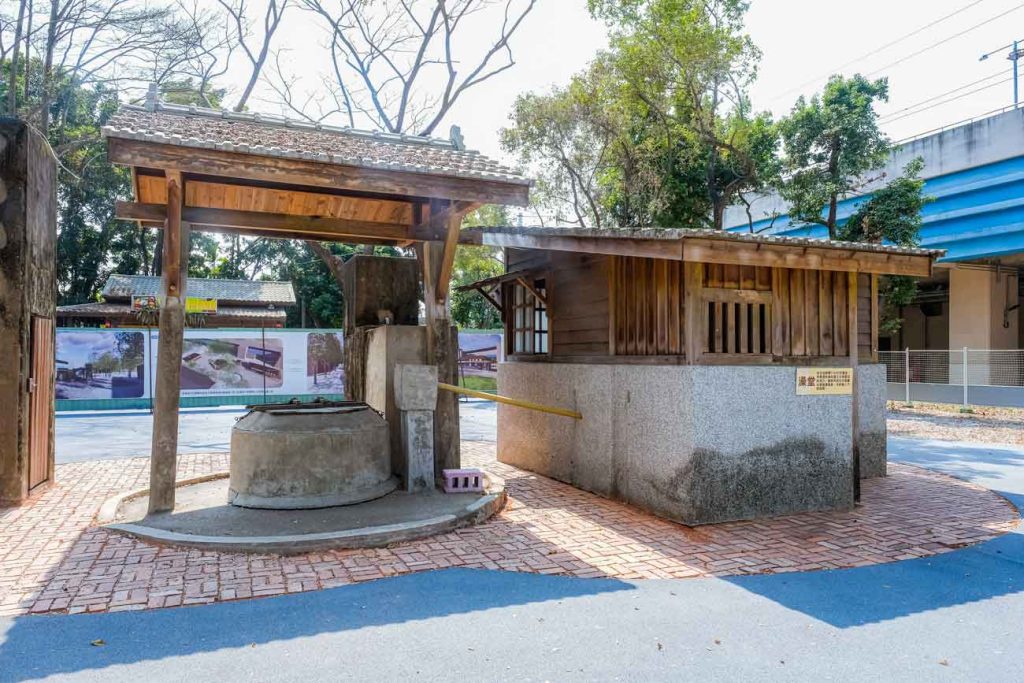
Zhutian Station
(竹田驛園)
Add: No. 27, Fengming Rd., Zhutian Township, Pingtung County
(屏東縣竹田鄉豐明路27號)
Tel: 0989-603-718
Hours: 9:30am ~ 5:30pm (closed on Monday)
Facebook: www.facebook.com/jhutian
Yamato Coffee Roasters
Off the edge of the Zhutian Station square, this sleekly modern café has been built “into” the concrete-wall ruins of a defunct rice mill, another project by the owner-operator of the aforementioned Yamato Café.
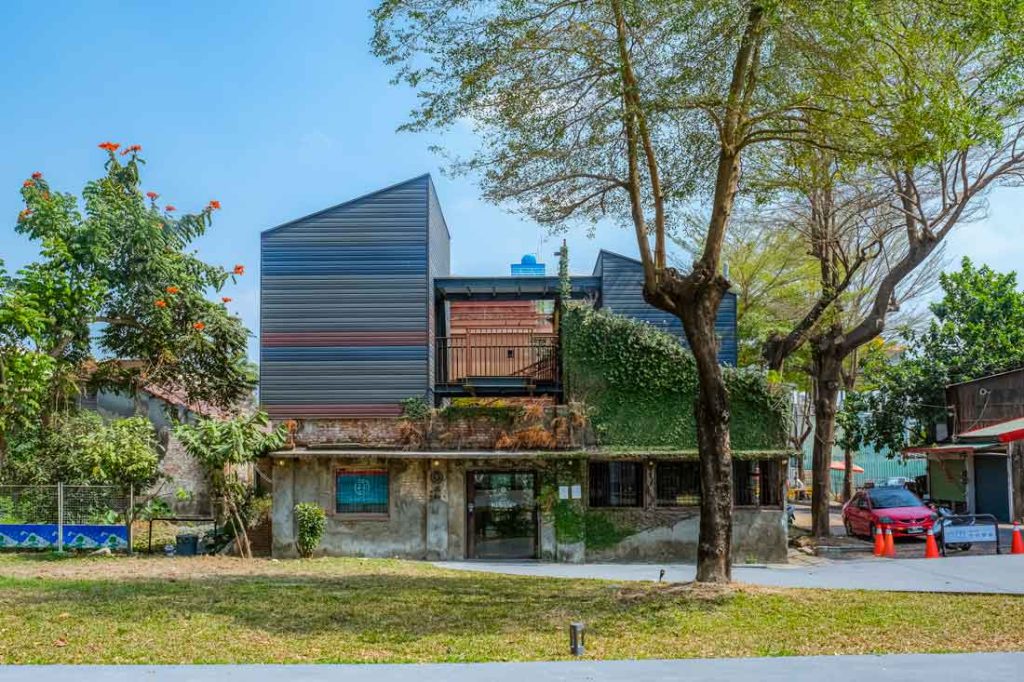
The Zhutian operation’s most arresting visual aspect is the “courtyard” in the rear. There was originally no courtyard here; the roof and large sections of the exterior walls are gone. Private air-con dining rooms of full glass have been built along the inner perimeter, looking into the middle, providing patrons full privacy while still in a full people-watching public space. On the beverage side of the menu (w/ English), unusual options are the iced lemonade with pomelo and back-sesame milk; the food side has bagels and quiche, croissant, and butter roll treats.
Yamato Coffee Roasters
(驛前大和頓物所)
Add: No. 26, Fengming Rd., Zhutian Township, Pingtung County
(屏東縣竹田鄉豐明路26號)
Tel: (08) 771-2822
Hours: 9am ~ 6pm
Facebook: www.facebook.com/coffeebeanstock
Chaozhou Township
Another farming-heavy locality, this is immediately south of Zhutian Township. “Chaozhou” refers to the Chaozhou area on China’s southeast coast, source of the original Han Chinese settlers.
Linhousilin Forest Park
East of the town of Chaozhou, this young park is 1,005ha in size, 85ha open to the public. You’ll be meandering one of a series of large carbon-reduction reforestation projects being undertaken by Taiwan’s Forestry Bureau. Long pathways take you through tree banks, soil-improvement and farming demonstration areas, and an eco-pond zone, and along a section of a major Pingtung irrigation-canal system. This land was put to use for sugarcane production by the Japanese; they also designed the canal system, built with hired Paiwan-tribe labor. Abundant and good English signage explains all you see.

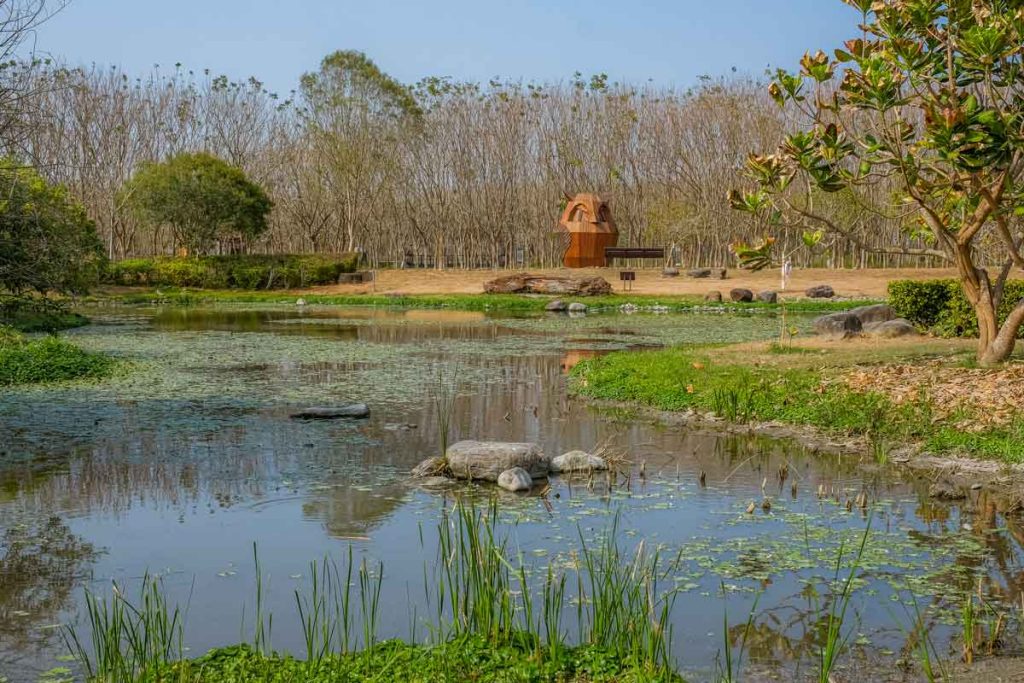
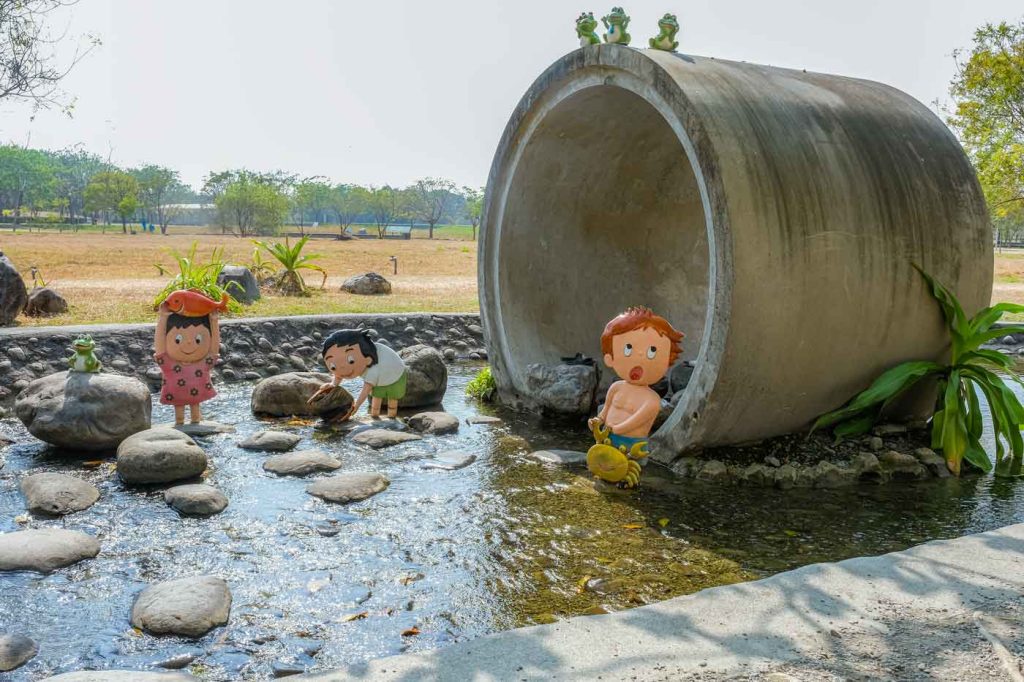
Chaozhou Cultural Park
In Chaozhou town, this is a complex of government dormitory-residence facilities developed by the Japanese. It was the site of one of the major battles of the anti-Japanese resistance. After WW II the complex was utilized by the Nationalist government as government offices and housing for government-official families. Today the ruins are being steadily resuscitated, and have become a key Chaozhou tourist attraction.
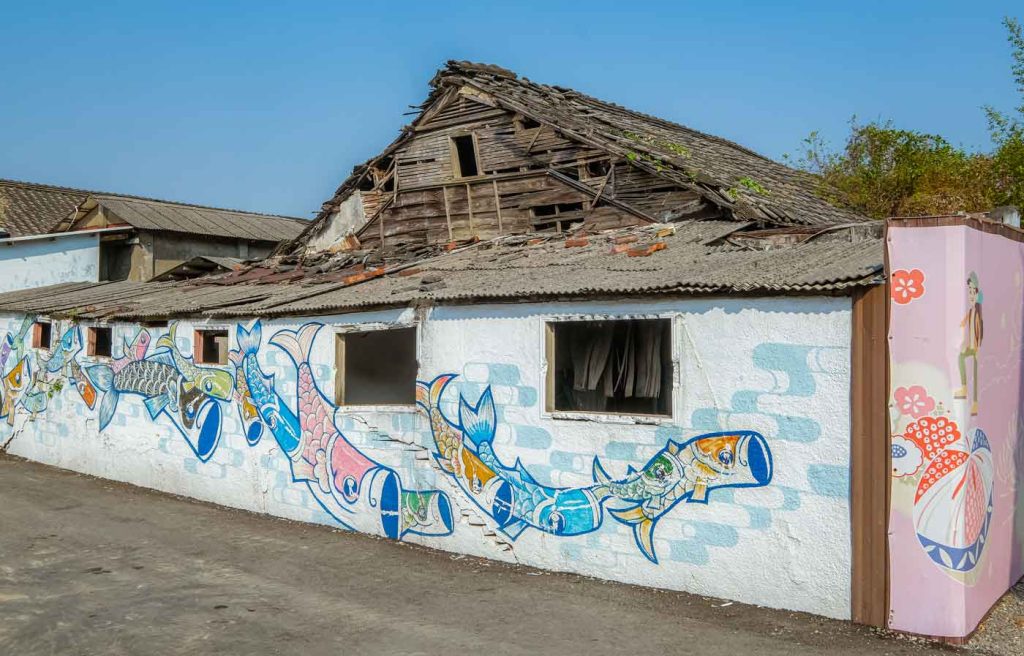
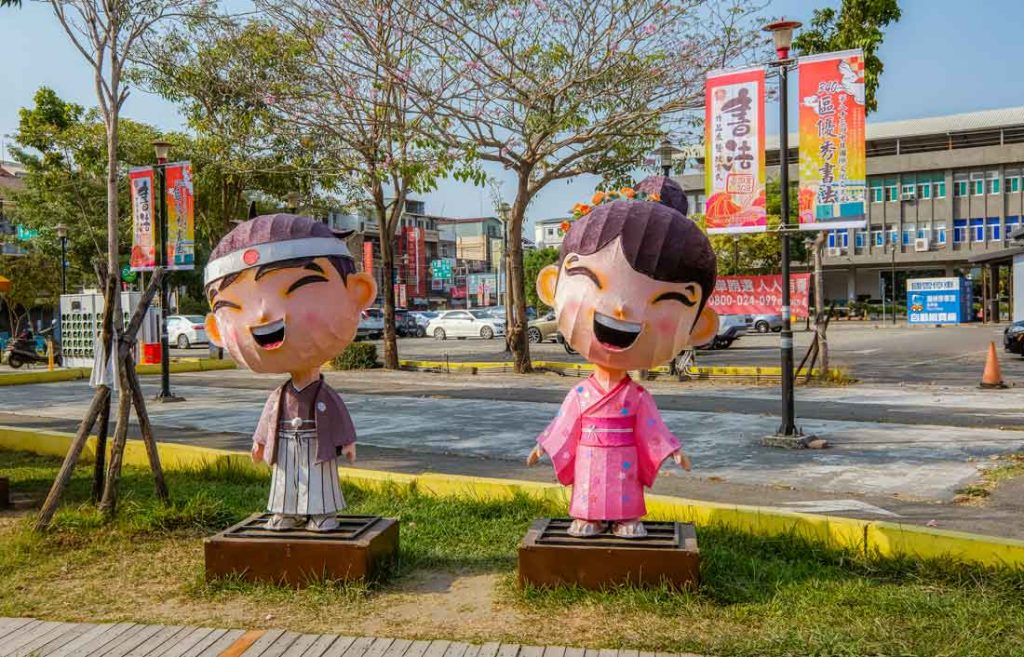
Decorative faux trees in full sakura blossom brighten the entrance area. The first entrance-area building is a visitor center with displays explaining the architecture and site-regeneration process (Chinese).
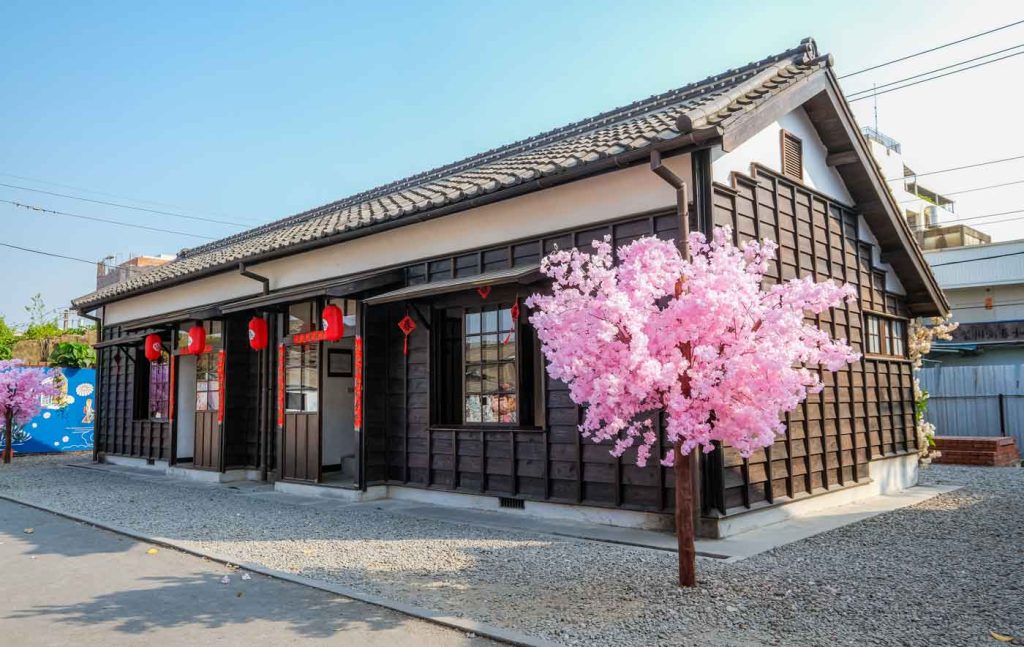
Chaozhou Cultural Park
(潮州日式歷史建築文化園區)
Add: No. 22, Yanping Rd., Chaozhou Township, Pingtung County
(屏東縣潮州鎮延平路22號)
Tel: (08) 789-4515
Hours: 9am ~ 5pm (closed on Monday)
Facebook: www.facebook.com/czone30
Eateries on/near the Chaozhou Circle
The area around Chaozhou Circle, a small roundabout vicinal to the just-introduced cultural park that is Chaozhou’s busiest spot, is an urban-forest of “old shop sign” family-run eateries. A-Lun Ice Shop is an open-faced enterprise right on the circle; here the heat-beating shaved ice creations come with steaming-hot old-timey treasures such as glutinous-rice balls, mung beans, and taro.
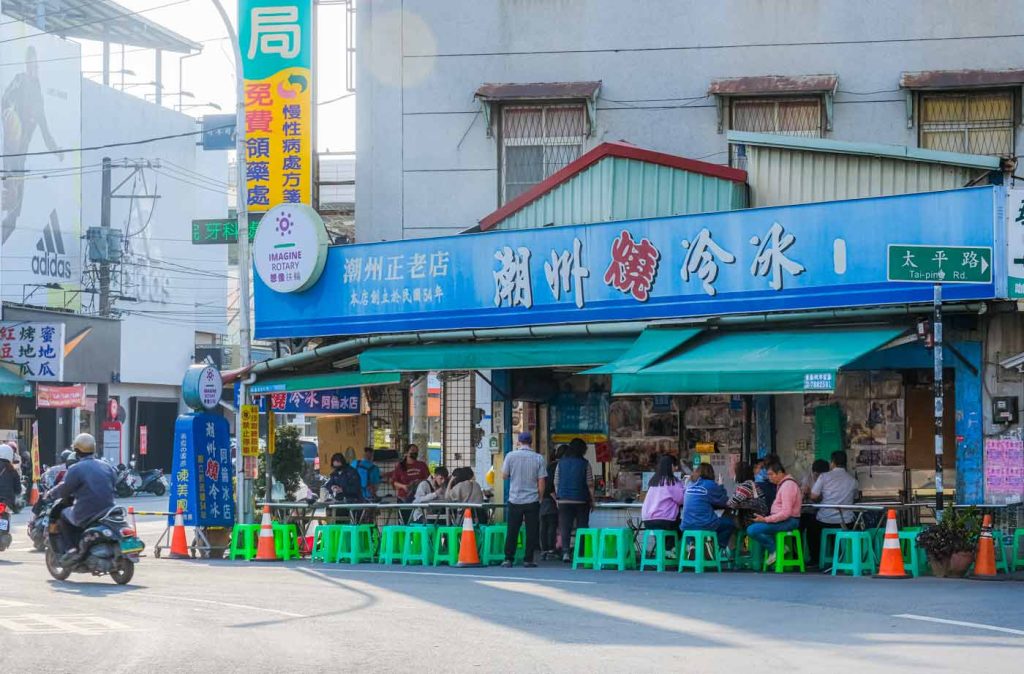
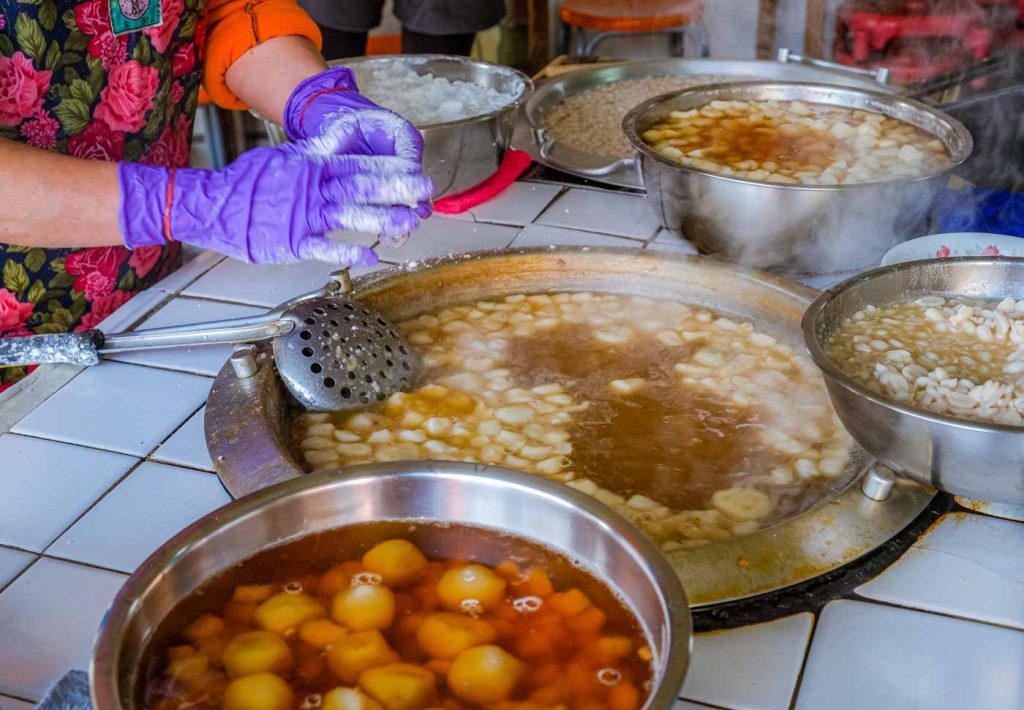
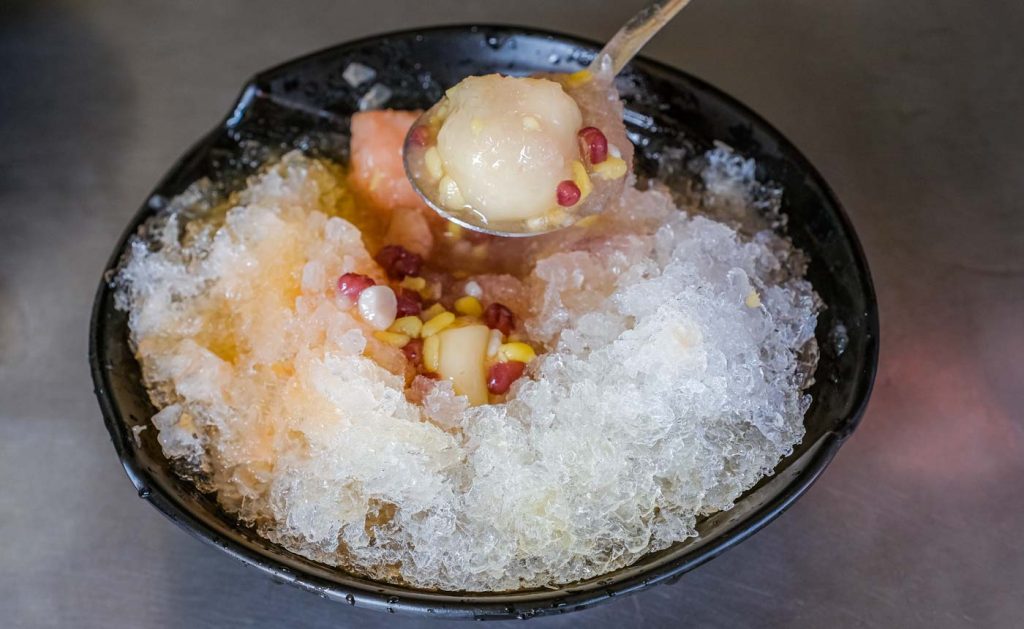
Off the circle, Lin Yao Hui Herb Tea, in a temple forecourt, sells delicious herb tea crafted from an old family medicinal herb store recipe.
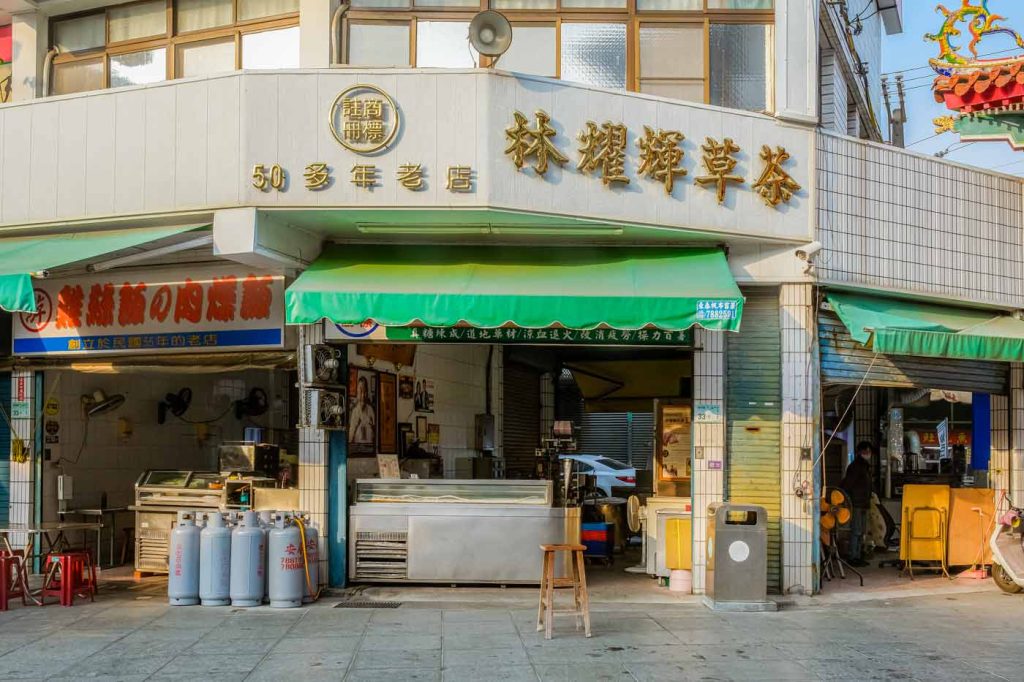
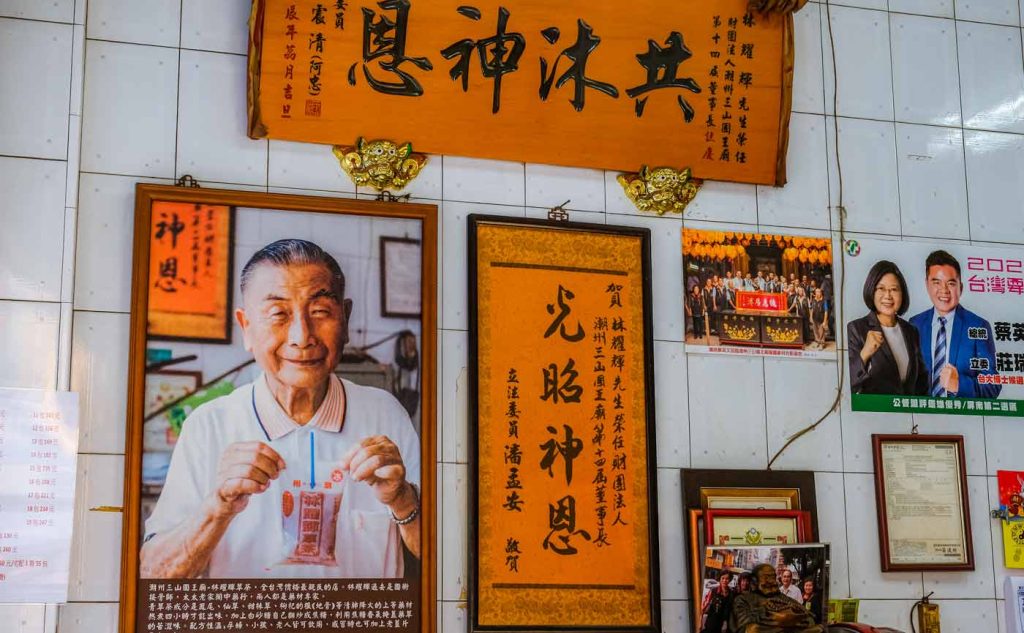

Also off-circle, A-Ming’s Steamed Buns uses distinctive local ingredients such as cane sugar, sesame, and taro.
